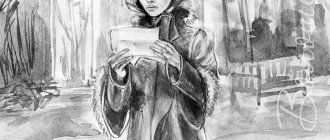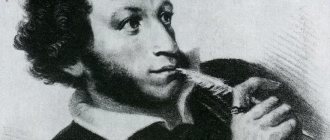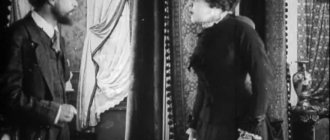Main characters
Before reading the summary of “Gobsek”, you should get acquainted with the main characters of the story.
- Gobsek is a very tight-fisted, mercantile moneylender, due to his occupation, but fair.
- Derville is an excellent lawyer, a decent person, an expert in his field.
- Count de Resto is a respected father of the family.
- His wife, the Countess, is a young and beautiful lady.
- Ernest is the eldest son of the count, his heir.
- Maxime de Tray is a fop, the Countess's lover.
- Viscountess de Granlier is a well-known lady in high society.
- Camilla, her young daughter, is in love with Ernest.
Countess Resto
We will continue our retelling of the brief content of “Gobsek” by Honore de Balzac with the story of the moneylender about this countess. Her lover lent the money from the moneylender, and she, fearing exposure, handed the moneylender a diamond. Looking at the handsome young blond man, the countess’s future could easily be predicted - such a dandy could ruin more than one family.
Derville completed a law course and received a clerk's position in a solicitor's office. To redeem the patent, he needs one hundred and fifty thousand francs. Gobsek lent him money at thirteen percent, and through hard work with the moneylender, Derville managed to pay off in five years.
A very short retelling
A brief summary of Balzac's story "Gobsek" should begin with a conversation that took place in the salon of the Viscountess de Granlier and her guest Derville. The conversation turned to the young Count de Resto, who had left the hospitable home a few minutes earlier.
The mistress of the house told her daughter Camilla that young de Resto was from a poor family and it was impossible to connect your life with him, despite his upbringing and pleasant manners. His mother was not of noble origin, and she spent all the family savings on her lover.
Derville, having heard the conversation, said that he had once known a certain Gobsek, a moneylender. He shared the following story.
One day Gobsek presented a bill of exchange to a countess. He was taken into account by a young man, handsome and dandy. The moneylender decided to visit the young woman to see what she was like, and at the same time to enjoy her confusion, because she was clearly insolvent.
She asked to defer payment. The moneylender agreed, but only until the next day. At that moment the count himself entered her room. The woman became worried, quietly placed a diamond in the moneylender’s hand, and he, in turn, handed her the bill and took his leave.
As soon as he left the luxurious mansion, a handsome young man, who had discounted the bill the day before, drove up to him. Gobsek informed him that he would keep the mortgage that the countess gave him for a few days, and also asked him to hand over two hundred francs. He took the money and from his grin the moneylender realized that the dandy was one of those who was capable of destroying the entire family.
Time passed, and Derville, who during this time had become a successful solicitor, was approached by a certain Maxime de Tray, a famous womanizer. He asked him to help improve relations with Gobsek, who no longer wanted to have anything to do with him. Derville takes him to the moneylender, where the Countess later appeared, having once given Gobsek a diamond. The old moneylender turned out to be right - the woman continued to squander the family's fortune.
As soon as the lovers left Gobsek’s apartment, the count himself appeared, wishing to redeem the pawned jewelry. Realizing that this will never stop, he, wanting to preserve the inheritance for his son, makes a deal, transferring everything he has to the moneylender.
Time passes and the count dies without having time to hand over important papers to his son. When Gobsek and Derville came to his house, the widow was looking for a will. Frightened by their appearance, she threw the found papers intended for Derville into the fire. Now, everything that she and her family owned passed into the hands of the old man.
To Derville's timid requests to spare the young count, who did not become the heir, he replied that such misfortunes are the best teacher. Appearing to the old man once again, he finds him near death.
At the conclusion of his story, the solicitor confidently declares to the Viscountess that very soon the young count will become the owner of a huge fortune after the death of Gobsek. To which she replies that to marry her daughter he needs to be very rich, and she will not have to meet her mother-in-law.
Gobsek
The lawyer Derville tells the story of the moneylender Gobsek in the salon of the Viscountess de Granlier, one of the most noble and wealthy ladies in the aristocratic Faubourg Saint-Germain. One day in the winter of 1829/30, two guests stayed with her: the young handsome Count Ernest de Resto and Derville, who was easily accepted only because he helped the owner of the house return property confiscated during the Revolution.
Continued after advertisement:
When Ernest leaves, the Viscountess reprimands her daughter Camilla: one should not so openly show affection to the dear count, because not a single decent family would agree to become related to him because of his mother. Although now she behaves impeccably, she caused a lot of gossip in her youth. In addition, she is of low origin - her father was the grain merchant Goriot. But the worst thing is that she squandered a fortune on her lover, leaving her children penniless. Count Ernest de Resto is poor, and therefore not a match for Camille de Granlier.
Derville, who sympathizes with the lovers, intervenes in the conversation, wanting to explain to the Viscountess the true state of affairs. He starts from afar: during his student years he had to live in a cheap boarding house - there he met Gobsek. Even then he was a deep old man of very remarkable appearance - with a “moon-like face”, yellow, like a ferret’s eyes, a sharp long nose and thin lips. His victims sometimes lost their temper, cried or threatened, but the moneylender himself always kept his cool - he was a “bill man,” a “golden idol.” Of all his neighbors, he maintained relations only with Derville, to whom he once revealed the mechanism of his power over people - the world is ruled by gold, and the moneylender owns gold. For edification, he talks about how he collected a debt from one noble lady - fearing exposure, this countess without hesitation handed him a diamond, because her lover received the money on her bill. Gobsek guessed the countess's future from the face of the blond handsome man - this dandy, spendthrift and gambler is capable of ruining the whole family.
Briefly exists thanks to advertising:
After completing a law course, Derville received the position of senior clerk in a solicitor's office. In the winter of 1818/19, he was forced to sell his patent - and asked one hundred and fifty thousand francs for it. Gobsek lent money to the young neighbor, taking from him “out of friendship” only thirteen percent - usually he took at least fifty. At the cost of hard work, Derville managed to get out of debt in five years.
One day, the brilliant dandy Count Maxime de Tray begged Derville to introduce him to Gobsek, but the moneylender flatly refused to give a loan to a man who had three hundred thousand in debt and not a centime to his name. At that moment, a carriage drove up to the house, Comte de Tray rushed to the exit and returned with an unusually beautiful lady - from the description, Derville immediately recognized her as the countess who had issued the bill four years ago. This time she pledged magnificent diamonds. Derville tried to prevent the deal, but as soon as Maxim hinted that he was going to commit suicide, the unfortunate woman agreed to the enslaving terms of the loan.
Continued after advertisement:
After the lovers left, the countess’s husband burst into Gobsek’s house demanding the return of the mortgage - his wife had no right to dispose of the family jewels. Derville managed to settle the matter peacefully, and the grateful moneylender gave the count advice: transferring all his property to a reliable friend through a fictitious sale transaction - this is the only way to save at least his children from ruin. A few days later the count came to Derville to find out what he thought about Gobsek. The solicitor replied that in the event of an untimely death, he would not be afraid to make Gobsek the guardian of his children, for in this miser and philosopher there live two beings - the vile and the sublime. The Count immediately decided to transfer all rights to the property to Gobsek, wanting to protect him from his wife and her greedy lover.
Taking advantage of the pause in the conversation, the Viscountess sends her daughter to bed - a virtuous girl has no need to know to what extent a woman can fall if she transgresses known boundaries. After Camilla leaves, there is no need to hide the names - the story is about Countess de Resto. Derville, having never received a counter-receipt about the fictitiousness of the transaction, learns that Count de Resto is seriously ill. The Countess, sensing a catch, does everything to prevent the lawyer from seeing her husband. The denouement comes in December 1824. By this time, the countess had already become convinced of the meanness of Maxime de Tray and broke up with him. She cares so zealously for her dying husband that many are inclined to forgive her for her past sins - but in fact, like a predatory animal, she lies in wait for her prey. The Count, unable to get a meeting with Derville, wants to hand over the documents to his eldest son - but his wife cuts off this path for him, trying to influence the boy with affection. In the last terrible scene, the Countess begs for forgiveness, but the Count remains adamant. That same night he dies, and the next day Gobsek and Derville appear in the house. A terrible sight appears before their eyes: in search of a will, the countess wreaked havoc in the office, not even ashamed of the dead. Hearing the steps of strangers, she throws papers addressed to Derville into the fire - the count’s property thereby becomes the undivided possession of Gobsek.
Briefly exists thanks to advertising:
The moneylender rented out the mansion, and began to spend the summer like a lord - in his new estates. To all Derville’s pleas to take pity on the repentant countess and her children, he answered that misfortune is the best teacher. Let Ernest de Resto learn the value of people and money - then it will be possible to return his fortune. Having learned about the love of Ernest and Camilla, Derville once again went to Gobsek and found the old man near death. The old miser bequeathed all his wealth to his sister’s great-granddaughter, a public wench nicknamed “Ogonyok.” He instructed his executor Derville to dispose of the accumulated food supplies - and the lawyer actually discovered huge reserves of rotten pate, moldy fish, and rotten coffee. Towards the end of his life, Gobsek's stinginess turned into mania - he did not sell anything, fearing to sell it too cheap. In conclusion, Derville reports that Ernest de Resto will soon regain his lost fortune. The Viscountess replies that the young count must be very rich - only in this case can he marry Mademoiselle de Granlier. However, Camilla is not at all obliged to meet with her mother-in-law, although the Countess is not barred from entering the receptions - after all, she was received at Madame de Beauseant’s house.
Summary
“Gobsek”, a summary of this story can be used in the reader’s diary and in preparation for the lesson.
In the cozy living room of the Viscountess de Granlier and her young daughter Camilla, the young heir of the late Comte de Resto named Ernest and a certain lawyer Derville whiled away the evening. The Viscountess's brother was also present. It was already quite late, so Ernest took his leave.
As soon as the sound of the departing carriage, to which Camilla had been listening so closely, died down, her mother quietly remarked that she should not show signs of attention to this young man. Otherwise, she will refuse him the house. The young Count de Resto, despite his excellent education and upbringing, is very poor. His mother at one time squandered both her dowry and her husband’s fortune, leaving her children without an inheritance, wasting it all on the young rake. Moreover, she was not from the upper class.
Derville heard this quiet conversation and decided to intervene. Someone may be surprised by the friendly relationship between the solicitor and the viscountess, but even in his young years, Derville noticed some inaccuracies in the papers when selling this lady’s house and declared that her family nest belonged to her by right. On her instructions, he began litigation and won the case.
At that time, the Viscountess's position was unenviable - she had just returned to France with the king's family and lived on the benefits assigned to her by the king. Meanwhile, the novice lawyer became bolder and undertook to help Madame de Granlier return her forest land, which had recently been assigned to a shelter for the elderly. He then restored her to ownership of shares and huge houses, which had been donated to public institutions.
So, the Viscountess’s young attorney put things in order, significantly enriching her income. He himself, thanks to his intelligence, hard work and honesty, achieved a high position in society and the deep favor of a noble lady. That is why she sat down in a chair, preparing to listen to the interesting story of her lawyer.
Derville said that in his youth he met a moneylender named Gobsek. He was of indeterminate age. It was impossible to understand from him whether he was a man who had grown old before his time, or whether he was already a very old man, well preserved for his years. His facial features were motionless and impassive, his hair was neatly combed, his eyes were small and piercing like gimlets. He constantly hid them under his cap. In his apartment, everything was always in its place, in a certain order, and life proceeded as if according to a schedule.
It was impossible to determine his age by his appearance
The only person with whom he communicated was young Derville, his neighbor. No one could know whether he was poor or rich. They never saw any money on him. Gobsek collected the bills himself, running all over Paris on thin legs. He was not passionate about anything, but once he told what his joys were.
The day before, he went to a young countess to collect a bill. The money was taken into account by a dandy, a young rake. The moneylender went to her early to take her by surprise. She clearly didn’t have the money to pay, and he was curious to see how she would get out. This picture always gave him pleasure.
The young countess was excited and asked to extend the payment period. The old man readily agreed, but only until the next day. The next minute the countess’s husband came into the living room, and she quickly thrust a diamond into Gobsek’s hand. He quietly handed her the bill, enjoying her fright. Leaving the mansion, he saw the gentleman who had arrived, who had taken into account her bill the day before. The moneylender ordered to give the lady 200 francs, and also said that the deposit would wait for her for another week. From the rake’s grin, he realized that he belonged to the type of people who were capable of squandering the entire fortune of their family and even their children.
Soon Derville was enrolled in the college of solicitors, and Gobsek gained confidence in the young specialist and often consulted with him. However, the office where Derville worked collapsed, and the owner sold it for a large sum. To redeem her, the solicitor turned to Gobsek for money. So he became the owner of his own office, paying a fabulous percentage to the moneylender.
After a while, the same rake Maxim de Tray turned to him and asked to bring him together with Gobsek. He came to the moneylender together with the young countess, with whom he was still in a relationship. They brought decorations, at the sight of which the old man’s eyes lit up.
Some time after they left, the woman’s husband appeared. After a difficult conversation, the count made a deal with Derville to try to leave at least something to the heir. It was decided to assign all the property to Gobsek, while leaving some share to Ernest.
After some time, the count found himself on his deathbed. He tried to give important papers to his son, but the Countess prevented him. She turned everything over in the dead man's room, trying to find documents. When Gobsek and Derville entered, she threw into the fire what she had managed to find, thereby depriving her son of his inheritance. Now everything belonged to Gobsek. During this time, Derville often came to the moneylender, urging him to take pity on Ernest, but he was adamant.
At this point the Viscountess interrupted her solicitor, asking how this story related to her family. Derville replied that he had recently visited Gobsek. He lies dying. Very soon the young count will become a rich man.
The tragedy of Gobsek
In the center of Honore de Balzac's story "Gobsek", a summary of which is presented above, is a man who has accumulated a huge fortune, but is left at the end of his journey completely alone. Gobsek – that’s the name of this hero – doesn’t communicate with anyone, doesn’t leave the house much. The only person he trusts is Derville. The moneylender saw in him a business friend, an intelligent interlocutor, and a good person.
The young lawyer, communicating with the old man, gains experience, asks for recommendations and advice. Observing the moneylender, Derville concluded that there were two people living in him: a vile and an exalted creature, a miser and a philosopher.
Life experience taught the old man to evaluate a person at first sight, to think and analyze. He often talked about the meaning of life. But with age, the passion for money still prevailed and gradually grew into worship. Sublime feelings grew into selfishness, greed and cynicism. If in his youth he dreamed of exploring the world, then by the end of his life his main goal became the hunt for money. But they did not bring him happiness; he died alone with his millions.
As can be seen from the summary of the chapters, Gobsek and his whole life are not a tragedy of an individual person, but of an entire system. Gobsek’s life only confirms the well-known expression: happiness cannot be found in money. Using his example, Balzac showed what the thoughtless worship of specie leads to.






